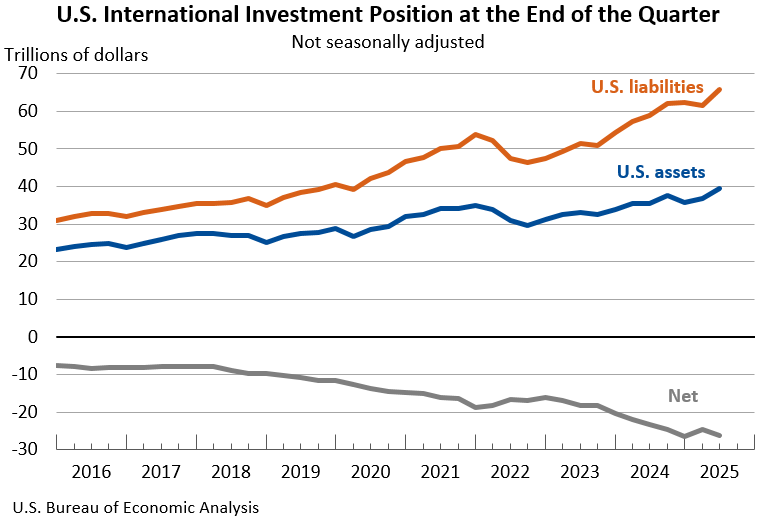Notice
Due to a lapse in appropriations, this website is not being updated.
Bureau of Economic Analysis
U.S. International Investment Position, 2nd Quarter 2025
The U.S. net international investment position, the difference between U.S. residents’ foreign financial assets and liabilities, was -$26.14 trillion at the end of the second quarter of 2025, according to statistics released today by the U.S. Bureau of Economic Analysis. Assets totaled $39.56 trillion, and liabilities were $65.71 trillion. At the end of the first quarter, the net investment position was -$24.65 trillion (revised).
Principal Federal Economic Indicators
Noteworthy
The Latest
Gross Domestic Product: First Quarter 2018 (Third Estimate)
Real gross domestic product (GDP) increased at an annual rate of 2.0 percent in the first quarter of 2018 (table 1), according to the "third" estimate released by the Bureau of Economic Analysis. In the fourth quarter, real GDP increased 2.9 percent.
U.S. Net International Investment Position First Quarter 2018
The U.S. net international investment position decreased to −$7,888.1 billion (preliminary) at the end of the first quarter of 2018 from −$7,725.0 billion (revised) at the end of the fourth quarter of 2017. The $163.1 billion decrease reflected net financial transactions of –$164.8 billion and net other changes in position, such as price and exchange-rate changes, of $1.7 billion.
U.S. Net International Investment Position First Quarter 2018
The U.S. net international investment position decreased to −$7,888.1 billion (preliminary) at the end of the first quarter of 2018 from −$7,725.0 billion (revised) at the end of the fourth quarter of 2017. The $163.1 billion decrease reflected net financial transactions of –$164.8 billion and net other changes in position, such as price and exchange-rate changes, of $1.7 billion.
U.S. International Investment Position, 1st quarter 2018, Year 2017, and annual update
The U.S. net international investment position decreased to -$7,888.1 billion (preliminary) at the end of the first quarter of 2018 from -$7,725.0 billion (revised) at the end of the fourth quarter of 2017, according to statistics released by the Bureau of Economic Analysis (BEA). The $163.1 billion decrease reflected a $182.8 billion decrease in U.S. assets and a $19.7 billion decrease in U.S. liabilities.
State Personal Income: First Quarter 2018
State personal income increased 4.3 percent at an annual rate in the first quarter of 2018, after increasing 4.7 percent in the fourth quarter of 2017. Personal income increased in all states and the District of Columbia. The percent change in personal income across all states ranged from 7.4 percent in Washington to 2.0 percent in Idaho.
State Quarterly Personal Income, 1st quarter 2018
State personal income increased 4.3 percent at an annual rate in the first quarter of 2018, after increasing 4.7 percent in the fourth quarter of 2017, according to estimates released today by the Bureau of Economic Analysis1 (table 1). Personal income increased in all states and the District of Columbia. The percent change in personal income across all states ranged from 7.4 percent in Washington to 2.0 percent in Idaho.
U.S. Current-Account Deficit Increases in First Quarter 2018
The U.S. current-account deficit increased to $124.1 billion (preliminary) in the first quarter of 2018 from $116.1 billion (revised) in the fourth quarter of 2017. As a percentage of U.S. GDP, the deficit increased to 2.5 percent from 2.4 percent. The previously published current-account deficit for the fourth quarter was $128.2 billion.
U.S. International Transactions, 1st quarter 2018 and annual update
The U.S. current-account deficit increased to $124.1 billion (preliminary) in the first quarter of 2018 from $116.1 billion (revised) in the fourth quarter of 2017, according to statistics released by the Bureau of Economic Analysis (BEA). The deficit was 2.5 percent of current-dollar gross domestic product (GDP) in the first quarter, up from 2.4 percent in the fourth quarter.
BEA on Track to Implement Third Phase to Combat Potential for Residual Seasonality in GDP
The U.S. Bureau of Economic Analysis is on track to soon implement the third phase of a three-pronged plan to mitigate any potential for residual seasonality in gross domestic product. That’s when seasonal patterns remain in the data even after they are adjusted for seasonal variations.
BEA laid out the plan in 2016, after conducting a painstaking component-by-component review of some 2,000 nominal data series included in GDP to…
April 2018 Trade Gap is $46.2 Billion
The U.S. monthly international trade deficit decreased in April 2018 according to the U.S. Bureau of Economic Analysis and the U.S. Census Bureau. The deficit decreased from $47.2 billion in March (revised) to $46.2 billion in April, as exports increased and imports decreased. The previously published March deficit was $49.0 billion. The goods deficit decreased $1.0 billion in April to $68.3 billion. The services surplus decreased less than $0.1…




